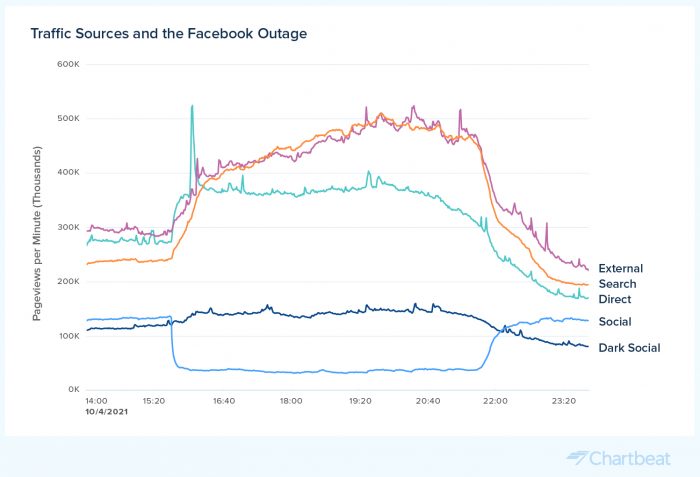
On August 3, 2018, Facebook went down for 45 minutes. That’s a little baby outage compared to the one this week, when, on October 4, Facebook, Instagram, and WhatsApp were down for more than five hours. Three years ago, the 45-minute Facebook break was enough to get people to go read news elsewhere, Chartbeat‘s Josh Schwartz wrote for us at the time.
So what happened this time around? For a whopping five-hours-plus, people read news, according to data Chartbeat gave us this week from its thousands of publisher clients across 60 countries.. (And they went to Twitter; Chartbeat saw Twitter traffic up 72%. If Bad Art Friend had been published on the same day as the Facebook outage, Twitter would have literally exploded, presumably.)

At the peak of the outage — around 3 p.m. ET — net traffic to pages across the web was up by 38% compared to the same time the previous week, Chartbeat found.
By the way, here’s how Chartbeat defines direct traffic and dark social, from CMO Jill Nicholson.
Direct refers to traffic where a visitor types in a URL or bookmarks a site. In Chartbeat, Direct traffic only happens on homepages or landing pages. If a visitor arrives on an article with no referrer info, we know the link was shared somewhere, so we consider it Dark Social.
— Jill Nicholson (@tumbling_after) October 8, 2021
And here’s a question a bunch of people had. We’ll update this post when we know!
We're looking into that. We should have the data ready early next week.
— Jill Nicholson (@tumbling_after) October 8, 2021
3 comments:
My coder is trying to convince me to move to .net from PHP.
I have always disliked the idea because of the costs. But he’s tryiong none the less.
I’ve been using WordPress on several websites for about a year and am nervous about switching to another platform.
I have heard very good things about blogengine.net.
Is there a way I can import all my wordpress posts into it?
Any help would be greatly appreciated!
Incredible points. Great arguments. Keep up the great spirit.
What’s Going down i am new to this, I stumbled upon this
I’ve found It absolutely useful and it has aided me out loads.
I hope too contribute & assist other customers like its
aided me. Great job.
my blog :: Lyn
Trackbacks:
Leave a comment